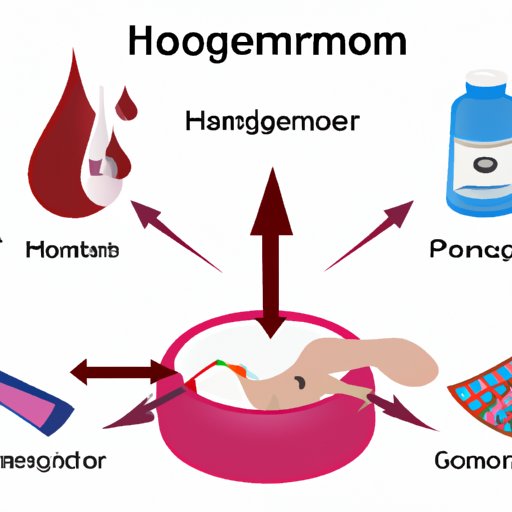
I. Introduction
Menstruation is a natural process for women in their reproductive age. It typically occurs every 28-35 days and lasts for 3-7 days. On the other hand, pregnancy is a time when a woman’s body is undergoing significant changes to nourish a developing fetus. But, can menstruation occur during pregnancy? In this article, we explore the possibility of menstruation during pregnancy and provide essential information on the topic.
II. Exploring the Possibility of Menstruation During Pregnancy: A Closer Look
Menstruation is a part of the reproductive cycle that occurs when a woman’s body is not pregnant. In the absence of pregnancy, the uterus sheds its lining, which causes the bleeding. However, when a woman conceives, her body goes through significant hormonal changes that prevent ovulation and the menstrual cycle.
III. Can You Still Get Your Period When Pregnant? All You Need to Know
During pregnancy, some women might experience bleeding, which can be worrisome. However, not all vaginal bleeding means that you are menstruating, and it is essential to understand the difference. Implantation bleeding, vaginal Infections, ectopic pregnancy, miscarriage, and placenta previa are some of the factors that can cause bleeding during pregnancy. Menstrual bleeding occurs when the uterine lining sheds, but during pregnancy, the lining is needed to support the growing fetus.
It is essential to understand that menstruation and pregnancy-related bleeding are different. Unlike menstrual bleeding, pregnancy bleeding is usually light and lasts for a short time. Furthermore, unlike menstrual bleeding, pregnancy-related bleeding does not follow a regular cycle.
Some common myths about menstruation during pregnancy include claims that a woman can continue to have periods throughout pregnancy, or that women can have regular periods during the early stages of pregnancy. These claims are untrue as menstruation is unlikely to occur during pregnancy.
IV. Understanding the Science Behind Menstrual Cycle and Pregnancy
The menstrual cycle is a delicate balance of hormones that prepare the body for menstruation, ovulation, and pregnancy. During ovulation, an egg is released from the ovaries, which can be fertilized by sperm, leading to pregnancy. However, when conception occurs, hormones released from the placenta prevent the normal hormonal cycle and menstruation. The placenta is an organ that develops after fertilization, which provides nutrients to the fetus and removes waste products from the baby’s blood.
During pregnancy, the body produces the hormone human chorionic gonadotropin (hCG), which prevents ovulation and the onset of menstruation. The increase in hCG levels in the body can cause pregnancy symptoms such as fatigue, nausea, and frequent urination.
It is important to note that while menstruation is unlikely during pregnancy, some women might experience light bleeding during the first few weeks of pregnancy, which they might confuse with menstruation. However, it is essential to get medical advice if you experience any bleeding during pregnancy as this could indicate a problem such as miscarriage or ectopic pregnancy.
V. Is it Possible to Mistake Pregnancy for Menstruation? Here’s What to Know
While menstruation is unlikely during pregnancy, some pregnancy symptoms such as bloating and cramps can be similar to menstrual symptoms. Additionally, some women might have light bleeding, which they might confuse with menstruation. In such cases, it is important to take a pregnancy test to confirm pregnancy. A pregnancy test can detect the hormone human chorionic gonadotropin (hCG) in the urine, which is produced during pregnancy.
In some cases, women might experience light periods during pregnancy, but these are not true menstrual periods. During the early stages of pregnancy, the body is still undergoing hormone changes, and some menstrual-like bleeding can occur. Nonetheless, light bleeding during pregnancy can be a sign of an ectopic pregnancy or an impending miscarriage, and it is essential to seek medical advice.
VI. Period vs Implantation Bleeding: How to Differentiate During Early Pregnancy
Implantation bleeding is a common occurrence during early pregnancy. Implantation bleeding occurs when the fertilized egg attaches itself to the uterus lining, causing light bleeding. While implantation bleeding can be brief and light, it is important to differentiate it from menstrual bleeding, which is typically more prolonged and heavier.
One way to differentiate implantation bleeding from menstrual bleeding is the duration and flow of blood. Menstrual bleeding typically lasts for three to seven days and is characterized by a heavier flow of blood with clots. On the other hand, implantation bleeding is shorter, lighter, and spottier, lasting for one to two days. Implantation bleeding is also accompanied by other pregnancy symptoms, such as spotting, cramping, and sore breasts.
VII. Conclusion
To sum up, it is unlikely to have a menstrual period during pregnancy, as the hormonal changes occurring during pregnancy prevent the ovary from releasing eggs and prevent the uterus’s shedding its lining. However, light bleeding during early pregnancy can occur and might be mistaken for menstruation. It is important to differentiate between the two and seek medical advice in case of any bleeding during pregnancy.
Remember, any bleeding during pregnancy, whether light or heavy, warrants a visit to a healthcare professional to ensure a healthy pregnancy and a healthy baby.





